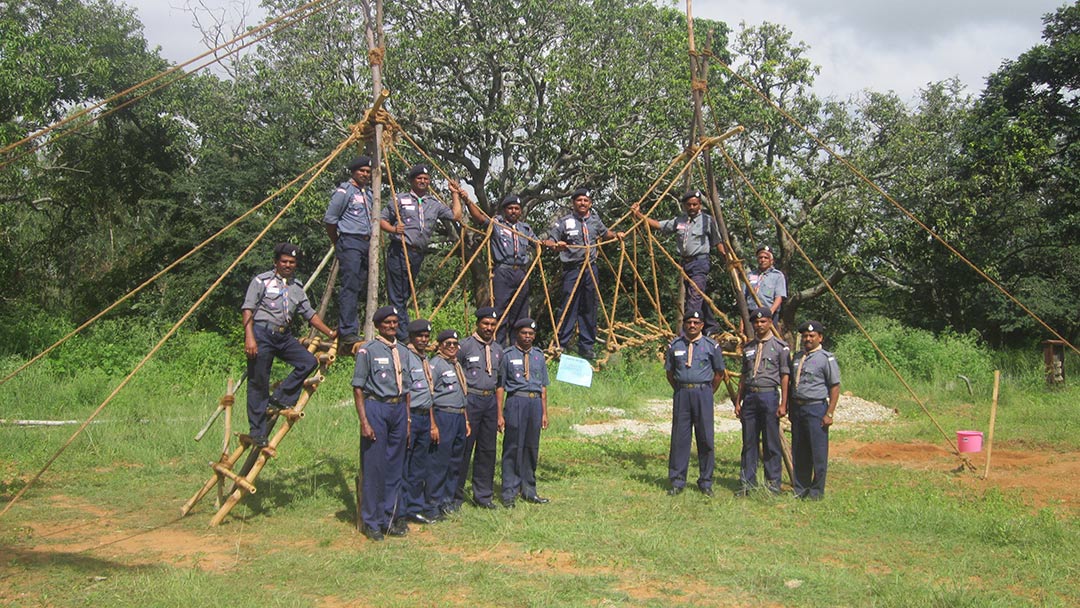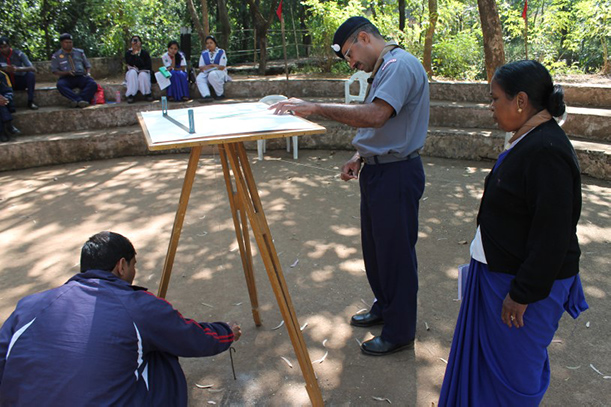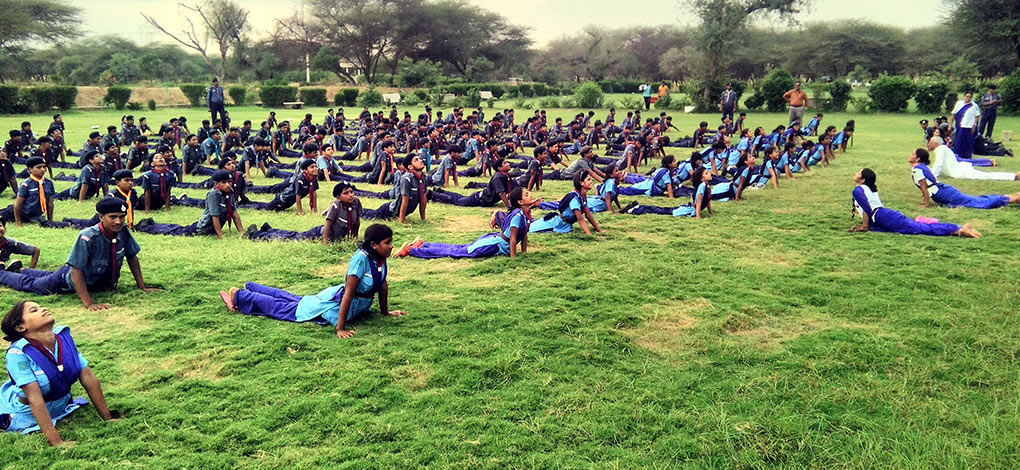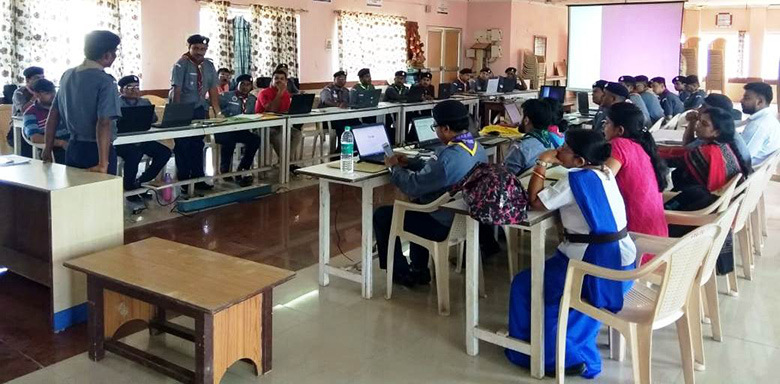Skill Training and Development
DDU-GKY
.jpg)
Deen Dayal Upadhyaya Grameen Kaushalya Yojana (DDU-GKY) is the skilling and placement initiative of the Ministry of Rural Development (MoRD)DDU-GKY is uniquely focused on rural youth between the ages of 15 and 35 years from poor families. As a part of the Skill India campaign, it plays an instrumental role in supporting the social and economic programmes of the government like the Make In India, Digital India, Smart Cities and Start-Up India, Stand-Up India campaigns. Over 180 million or 69% of the country's youth population between the ages of 18 and 34 years, live in its rural areas. Of these, the bottom of the pyramid youth from poor families with no or marginal employment number about 55 million.
DDU-GKY Haryana
.jpg)
The Bharat Scouts and Guides received a target of 280 candidates via sanction order date 25/10/2019 to be trained and placed in Health care and Apparel sector.
- The Bharat Scouts and Guides proposed total 2 centres in Hisar and Sirsa.
- 1st batch of 51 candidates commenced at SDC -Sisai (Hisar) in dec. 2020.
- Training was temporarily suspended on 26th April 2021 due to covid-19 infection at the training center.
- Resumed training on 5th July 2021.
.jpg)
DDU-GKY Uttar Pradesh
The Bharat Scouts and Guides received a target of 540 candidates via sanction order date 28/12/2020 to be trained and placed in Customer Care Executives & Retail Sale Associates.
- BSG Inter-college at Mumfordganj (prayagraj) is identified and developed as skill development center as per norms of the scheme.
- Recruitment of staff is under process.
- Mobilisation of beneficiaries is done.
- Expecting commencement of training in 1st week of august 2021.
- Overall under progress but delayed due to covid-19, 2nd wave.
PMKVY
.jpeg)
Pradhan Mantri Kaushal Vikas Yojana (PMKVY) is the flagship scheme of the Ministry of Skill Development & Entrepreneurship (MSDE) implemented by National Skill Development Corporation. The objective of this Skill Certification Scheme is to enable a large number of Indian youth to take up industry-relevant skill training that will help them in securing a better livelihood. Individuals with prior learning experience or skills will also be assessed and certified under Recognition of Prior Learning (RPL).
.jpeg)
- 120 no. for BSG Baramulla and 30 No. of BSG Kandhamal(old pending 1 batch) are successfully trained.
- 3 Centres of The Bharat scouts and Guides were also established in N.E. Region for the approved target of 920 Candidates in SPECIAL PROJECT OF PMKVY.
Seekho Kamao
“Seekho aur Kamao (Learn & Earn)” is a scheme implemented since 2013-14 for skill development of minorities. The scheme aims at upgrading the skills of minority youth in various modern/traditional skills depending upon their qualification, present economic trends and market potential, which can earn them suitable employment or make them suitably skilled to go for self-employment. The scheme is implemented through selected expert Project Implementing Agencies (PIAs).The scheme ensures placements of minimum 75% trainees, out of which at least 50% placement is in organized sector.
- The Bharat Scouts and Guides has been sanctioned a target of 407 candidates to be trained and placed under the Ministry of Minority Affairs, Govt. of India.
- Job role selection and centre propose is still under process.
- In progress .Delayed due to covid-19, 2nd wave.
BSG Special Courses
Self Learning Modules
- Fundamentals of the Bharat Scouts & Guides.
- Be able to define safe working load of rope.
- Be able to take proper care of the rope.
- Know about self measurement.
Residential Modules

- Course Routine and Objectives.
- Fell a 9 inch tree or scaffolding a pole neatly and quickly.
- Have a knowledge of various ropes, sizes, storing laying and caring.
- Tie eight kinds of knots quickly or blind folded. Bowline on bight, cats paw, double sheet bend, manhamess knot, marline spike hitch, or lever hitch, draw hitch or highwayman’s hitch, fisherman’s bend or fisherman’s hitch.
- Lash spars properly together.
- Build model bridge or Derrick and Ladders.
- Make a camp kitchen
- Build a Hut/Shelter of one kind or another suitable for three person.
- Measure length of the rope.
- Be able to define safe working load of rope.
- Be able to take proper care of the rope.
- Be able to use blocks, tackles and pulleys in pioneering work.
- Practical life-line throwing.
- Be able to use 3 / 2 / 1 hold fast and dead man’s anchorage.
- Know about self measurement.
- Know the method of heights, width, depth weight measurement.
- Open Session - Evaluation - Final Talk - Closing
Self Learning Modules

- Fundamentals of the Bharat Scouts & Guides
- Knowledge of various types of natural and man - made Disasters.
- Knowledge of accident prone areas at roads, bathing places, places of gatherings, meals, etc. in her locality.
- Knowledge of civil defence and Fire Services.
- Knowledge of Ambulance Service.
- Knowledge of HAM Service.
- Knowledge of storm and distress signals.
-
Safety Knowledge:
- Traffic Safety
- Home Safety
- Industrial safety
- Knowledge of rehabilitative methods and Governmental and Non - Governmental agencies that can support.
- Knowledge of anti-social elements causing disasters by various means.
- Knowledge of Blood donation.
Residential Modules
- Course Routine and Objectives
- Knowledge of establishing messenger service including sending messages by phone, telex and fax.
- Reporting local situation in calamities, disasters and accidents.
-
Practical Skills: (A combination to be made according to the needs of the area).
- Pioneering and axemenship.
- Bridge building and improvisation of shelters.
- First Aid.
- Rescue from water and fire.
- Fire fighting.
- Traffic control and road safety.
- Removal of victims from debris and carriage of casualties.
- Methods of providing temporary sanitary arrangements and their up keep.
- Purification of water.
- Signalling - Semaphore
- Open Session - Evaluation - Final Talk - Closing.
Self Learning Modules
.jpg)
- Fundamentals of the Bharat Scouts & Guides.
- What is Campfire Origin and Significance.
- Leadership Qualities & Campfire Leaders.
- Different types of Campfires.
- Cub / Bulbul Campfire - Red Flower / Kalrav.
- How to Conduct a Campfire.
- Opening and Closing Ceremony.
- Responsibilities of Patrol Q.M. / Company Q.M.
- Preparation of campfire Programme.
- Do’s & Dont’s in the Campfire.
Residential Modules
- Course Routine and Objectives
- Types of fire (Laying, lighting, putting out fire). Arrangement of Firewood.
- Opening and Closing Ceremony.
- Singing Songs and Yells.
- Dress in Campfire, Improvisation.
- Games to be used.
- Preparation of campfire Programme.
- Yells and appreciation in Campfire.
- Open Session - Evaluation - Final Talk - Closing.
Self Learning Modules
- Fundamentals of the Bharat Scouts & Guides.
- Introduction of Signalling.
- Introduction of Morse Code.
- Numerical Signs.
- Introduction of Semaphore.
Residential Modules

- Course Routine and Objectives
- Fundamentals and Methods of Signalling.
- Introduction of Morse Code.
- Signalling by Flag, Whistle, Light and Buzzer.
- Numerical Signs.
- Morse Code and Morse Key use.
- Communication of Message by Morse.
- Communication of Message by Semaphore.
- Open Session - Evaluation - Final Talk - Closing.
Self Learning Modules
.jpg)
- Fundamentals of the Bharat Scouts & Guides.
- Law and Promise
- Ten Recommendations of Success
- Service to God and the Community.
- The Spiritual Dimension of Guiding and the Young People.
- 14 Programme Ideals.
- Indian Citizenship.
- Fundamental Duties.
- Fundamental Rights.
Residential Modules
- Course Routine and Objectives.
- A Literary of Guide Law.
- Prayer and Meditation.
- The Programme of the section related to the Aim and Method of Association.
- Indian Citizenship.
- Fundamental Duties.
- Fundamental Rights
- A Guide Law, Implementation & Evaluation.
- Open Session - Evaluation - Final Talk - Closing.
Self Learning Modules
- Fundamentals of the Bharat Scouts & Guides.
- Define what is Map and what are the uses of a map
- Draw conventional signs used in Survey of India maps.
Residential Modules

- Course Routine and Objectives.
- Read bearings using a magnetic compass and plot to scale on paper, any given location on ground.
- Set a map and read a map.
- Draw conventional signs used in Survey of India maps.
- Identify locations through and reference and describe the routes connecting them.
- Workout a Radiant laying between two adjacent contours lines on a map.
- Map making by a) Road Travers Method; B) Plain Table Survey.
- Survey a given plot using the plane table method.
- Say how mapping is useful in Guiding.
- Identification and study of toposheets.
- Identifying the importance of constellation.
- Find out the North with the help of Stars.
- Open Session - Evaluation - Final Talk - Closing.
Self Learning Modules
- Course Routine and Objectives.
- Fundamentals of the Bharat Scouts & Guides.
- First Aid Syllabus upto Dwitiya and Tritiya Sopan.
- Duties and Responsibilities of First aider.
Residential Modules
.jpg)
- Course Routine and Objectives.
- First Aid Syllabus upto Dwitiya and Tritiya Sopan.
- Deal with Bleeding - major and minor.
- Diagnose and blind a broken limb.
- Deal with choking by Heimlich’s maneuver.
- Mouth to Mouth resuscitation.
- Preparation of a Stretcher and apply a roller bandage.
- Sending a correct message, verbal, written or by telephone.
- Methods of carrying causalities.
- Open Session - Evaluation - Final Talk - Closing.
Self Learning Modules
- Fundamentals of the Bharat Scouts & Guides.
- The introduction of Yoga & its meaning, its origin, literature & utility.
Residential Modules

- Course Routine and Objectives.
- Yoga Prayers & Shanti Path.
- Kinds of Yoga, Gyan of Yoga, Bhakti Yoga, Karam Yoga, Raj Yoga & Hatya Yoga.
-
Ashtang Yoga:
- Anatarang Yoga - Pratyahar, Dharma, Dhiyana, Samadhi.
- Bahirang Yoga - Yam, Niyama, Asana, Pranayama.
- Hatya Yoga: Asana, Pranayama, Mudra, Bandh, Shath Karma.
-
Some kind of Yoga practices
- Asanas, Inverted balancing, sitting, laying, standing.
- Micro Yoga practices - Kriyas.
- Surya Namaskar
- Suddhi Kriya (Cleaning process) - Neti, Nauli, Dhauti.
- Pranayams: Retention, fast breathing & slow breating, Bhramari.
- Techniques of concentration Yoganidra, Tratak, Meditiation.
- Open Session - Evaluation - Final Talk - Closing.
Self Learning Modules
- Fundamentals of the Bharat Scouts & Guides.
- Organisation of the Movement.
- Needs and aspirations of youth.
- Leadership qualities.
- Duties and responsibilities of Adventure leaders.
- Venture clubs.
- Upa Rashtrapati Award and Prime Minister Shield Competitions.
Residential Modules
- Course Routine and Objectives.
- Learn Guide Skills upto Dwitiya Sopan level.
- Understand safety measures in Adventure Programme.
- Understand and learn First and Rescue Skills.
- Nature ramble and nature study.
- Preparation / construction of obstacles.
- Basic Knowledge of Rock climbing, mountaineering.
- Knowledge of cooking, preparing camp menu and balanced diet while in Jungle.
- Prepare, practice and participate in obstacles and adventure based activities.
- Open Session- Evaluation - Final Talk - Closing.
Self Learning Modules
- Fundamentals of the Bharat Scouts & Guides.
- Basic computer terminology.
- What is a computer?
Residential Modules

- Course Routine and Objectives.
- What is an operating system?
- What are the major physical components of the computer?
- What is the desktop?
- What are the major components of a window?
- Navigating a web page
- Web browsing (Chrome, Netscape, Mozilla)
- File Management
- Power Point Presentation
- Social Networking
- Open Session - Evaluation - Final Talk - Closing.
Self Learning Modules
.jpg)
- Fundamentals of the Bharat Scouts & Guides.
- Define the Environment
- What is Nature, What is Ecology and Environment?
- Knowledge of the Ecological Balance
-
Knowledge about
- Reasons of Soil Erosion and its protection
- Tree cutting - Tree Plantation
- Conservation of wild Animals
- Stop Water pollution and Wastage of Water
- Stop Air Pollution
- Littering
- Educate the people about the pollution problems-Cause by a Human being
- Global Warming
Residential Modules
- Course Routine and Objectives.
- How to educate people about balancing the Ecology and Environment
-
Knowledge about
- Reasons of Soil Erosion and its protection
- Tree cutting - Tree Plantation
- Conservation of wild Animals
- Stop Water pollution and Wastage of Water
- Stop Air Pollution
- Littering
- Educate the people about the pollution problemsCause by a Human being
- Consumption of Energy
- Know about the Government, Non - Government and other International organisations working on Environment and Ecology.
- Open Session - Evaluation - Final Talk - Closing.
Self Learning Modules
- Fundamentals of the Bharat Scouts & Guides
- Leadership - Introduction to Leadership, Leadership Power, Leadership Styles, Leadership in Administration.
- Interpersonal Relations - Introduction to Interpersonal Relations, Analysis of different ego states, Analysis of Transactions, Analysis of Strokes, Analysis of Life position.
- Communication - Introduction to Communication, Flow of Communication, Listening, Barriers of Communication, How to overcome barriers of communication.
- Stress Management - Introduction to Stress, Causes of Stress, Impact Stress, Managing Stress.
- Group Dynamics and Team Building - Importance of groups in organization, Interactions in group, Group Decision Taking, Team Building, Interaction with the Team, How to build a good team?
- Conflict Management - Introduction to Conflict, Causes of Conflict, Managing Conflict
- Time Management - Time as a Resource, Identify Important Time Wasters, Individual Time Management Styles and Techniques for better Time Management.
- Motivation - Introduction to Motivation, Relevanceand types of Motivation, Motivating the subordinates, Analysis of Motivation
Residential Modules
.jpg)
- Course Routine and Objectives.
- Interpersonal Relations - Introduction to Interpersonal Relations, Analysis of different ego states, Analysis of Transactions, Analysis of Strokes, Analysis of Life position.
- Communication - Introduction to Communication, Flow of Communication, Listening, Barriers of Communication, How to overcome barriers of communication.
- Stress Management - Introduction to Stress, Causes of Stress, Impact Stress, Managing Stress.
- Group Dynamics and Team Building - Importance of groups in organization, Interactions in group, Group Decision Taking, Team Building, Interaction with the Team, How to build a good team?
- Group Dynamics and Team Building - Importance of groups in organization, Interactions in group, Group Decision Taking, Team Building, Interaction with the Team, How to build a good team?
- Conflict Management - Introduction to Conflict, Causes of Conflict, Managing Conflict
- Time Management - Time as a Resource, Identify Important Time Wasters, Individual Time Management Styles and Techniques for better Time Management.
- Motivation - Introduction to Motivation, Relevance and types of Motivation, Motivating the subordinates, Analysis of Motivation.
- Table Manners
- Open Session- Evaluation -Final Talk -Closing.
Self Learning Modules
- Fundamentals of the Bharat Scouts & Guides.
- Understanding basics of groundwater, hydrogeology and hydrometeorology.
- Introduction to water conservation and assessment, Severity of water crisis, importance of conservation Soil, Plant, Atmosphere Continuum (SPAC); Water use efficiency.
- Water resources conservation and management, Water conservation measures.
- Water policy and legislation; Fiscal incentives and disincentives.
Residential Modules
- Course Routine and Objectives.
- Introduction to water conservation and assessment, Severity of water crisis, importance of conservation Soil, Plant, Atmosphere Continuum (SPAC); Water use efficiency.
- Water resources conservation and management, Water conservation measures.
- Traditional systems and man-made structures (ponds, tanks, reservoirs), Minimizing evaporation loses, Rainwater harvesting and groundwater recharging, Irrigation: types, cheduling, efficiency and designing
- Planning, designing, construction process, maintenance and monitoring mechanisms; Components like filters, costing, water quality issues, treatment options, etc
- Models of rainwater harvesting from residential and institutional buildings, colonies, industries, training centers, public areas like parks, airports, forested areas, etc.
- Strategies for catalysing rain harvesting; Experiences & examples.
- Open Session- Evaluation -Final Talk -Closing.
Self Learning Modules
- Fundamentals of the Bharat Scouts & Guides.
- Identification of a Project and Analyse it parts.
- Critical Path Method (CPM) and how it’s used in project management.
- Time Management
Residential Modules
- Course Routine.
- Course Objectives & Methods
- Planning
- Resource mobilization
- Budgeting
- Time Management
- Project Monitoring
- Project Evaluation
- Preparation of Project Report
- 3 different projects case study and practical project preparation.
- Open Session - Evaluation - Final Talk - Closing.
Self Learning Modules
- Fundamentals of the Bharat Scouts & Guides.
- Make a layout plan of a typical campsite. Show the position of the camp kitchen, the fireplace, dining, latrine and tentage for at least Four Patrols.
- Explain how and why weather, season, wind, fuel, and water supply are taken into consideration when choosing a site. Explain what care to take with regard to safe water, sanitary facilities, and emergencies.
-
Prepare a checklist detailing :
- the personal kit that you will need for a Unit camp for a week;
-
the personal kit that you will need for a weekend hike;
- in summer
- in winter;
- all the camping equipment needed for a week camp.
Residential Modules
.jpg)
- Course Routine.
- Course Objectives & Methods.
- Make a layout plan of a typical campsite. Show the position of the camp kitchen, the fireplace, dining, latrine and tentage for at least Four Patrols.
- Explain how and why weather, season, wind, fuel, and water supply are taken into consideration when choosing a site. Explain what care to take with regard to safe water, sanitary facilities, and emergencies.
- Demonstrate how to pack correctly your personal kit in a rucksack for an overnight Patrol camp.
-
Prepare a camp menu for an overnight Patrol camp of at least eight Scouts covering breakfast, lunch and Dinner.
List the materials required for your menu that you can get from your local store. -
At a Week Patrol camp (Seven days) :
- Assist in the preparation of the camp programme.
- Lay out the campsite according to the principles in (1) above.
- With another Scouter/Guider, pitch a Tent, or build a shelter, taking into consideration the weather. Strike and pack the tent, or dismantle the shelter. Know how to take are of tents, including the correct storage of tents between camps.
- While camping, cook all meals for yourself for twenty-four hours. Raw ingredients must be used in cooking the meals.
- Make a comfortable bed on the ground and sleep in it.
-
While in camp show the right way to
- store your food and gear against heat, animals, insects, and wet in bad weather;
- dispose of refuse and maintain correct hygiene standards.
- take precautions against the spread of fires.
- Make five camp gadgets in camp and use them.
- Open Session - Evaluation - Final Talk - Closing.

